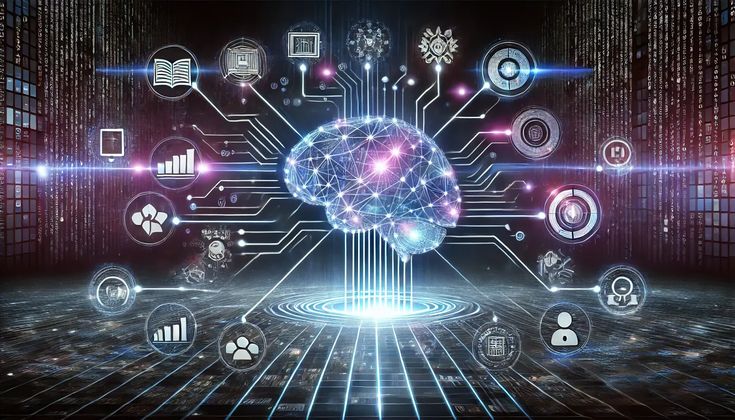1. Machine Learning Engineering

Machine Learning (ML) Engineering is at the heart of modern AI development. It focuses on building intelligent systems that learn from data, identify patterns, and make predictions without human intervention. ML engineers design and implement algorithms that allow applications to improve automatically with experience. These models are crucial across industries like healthcare, where they diagnose diseases; in finance, where they predict market trends; and in logistics, where they optimize operations.
Mastery of ML requires a strong foundation in mathematics, statistics, and programming, as well as familiarity with frameworks such as TensorFlow, PyTorch, and Scikit-learn. As organizations increasingly automate processes, the demand for ML engineers has surged globally. They play a key role in creating efficient, scalable AI models that enhance business performance, reduce costs, and improve user experience. This skill will remain a cornerstone for future AI innovations and industrial transformations.
2. Supervised Learning
Supervised learning is a primary subfield of machine learning focused on training algorithms using labeled datasets. The goal is to teach models to predict specific outcomes based on known examples. This approach powers applications like medical diagnosis from imaging data, fraud detection in banking, and sales forecasting. Professionals in this area must understand regression, classification, and evaluation metrics such as accuracy and precision.
Thank you for reading this post, don't forget to subscribe!Tools like Scikit-learn and TensorFlow are frequently used for supervised model training. As organizations collect vast amounts of labeled data, supervised learning becomes increasingly important for extracting actionable insights. The ability to build predictive systems that learn from past examples and make accurate future predictions is highly valued across industries, ensuring continuous demand for experts in this skill.
3. Unsupervised Learning

Unsupervised learning deals with unlabeled data, allowing AI systems to find hidden patterns and relationships within datasets. It’s widely used in clustering, anomaly detection, and recommendation systems. For example, e-commerce platforms use unsupervised algorithms to segment customers based on behavior, while cybersecurity systems use them to detect irregular network activity. Professionals skilled in unsupervised learning work with algorithms like K-Means, PCA (Principal Component Analysis), and autoencoders. This skill is vital for businesses aiming to uncover insights without predefined labels, enabling smarter decisions from raw data. As data volume grows exponentially, the ability to identify meaningful structures within massive datasets makes unsupervised learning an indispensable skill in AI development.
4. Reinforcement Learning
Reinforcement Learning (RL) enables AI systems to learn by interacting with environments and receiving feedback in the form of rewards or penalties. This paradigm is the backbone of modern robotics, game AI, and autonomous vehicles. RL algorithms help machines make sequential decisions and improve over time, just like humans learning through experience. Engineers working with RL use frameworks like OpenAI Gym, DeepMind’s libraries, and TensorFlow Agents. The future of automation will heavily rely on RL for adaptive systems capable of continuous learning. As industries push for smarter machines that can act autonomously, reinforcement learning experts will be at the forefront of innovation in robotics, control systems, and adaptive AI.
5. Deep Learning
Deep Learning is a subset of machine learning focused on neural networks that simulate human brain activity. It powers breakthroughs in image recognition, speech synthesis, and natural language understanding. Using architectures like CNNs, RNNs, LSTMs, and Transformers, deep learning models have revolutionized industries such as autonomous driving and healthcare. Professionals need to master libraries like TensorFlow and PyTorch, along with GPU acceleration and large-scale data handling. As models become more advanced, deep learning experts are crucial for building high-performance AI systems that can perceive, reason, and generate. With the rise of generative and multimodal AI, deep learning is poised to remain one of the highest-paying and fastest-growing AI specializations.
6. Generative AI

Generative AI focuses on enabling machines to create new and original content—text, images, music, and even code—using models like GPT, Stable Diffusion, and MidJourney. This technology is reshaping industries such as marketing, gaming, design, and entertainment. It allows creators to generate ideas, prototypes, or final outputs faster and more efficiently. Professionals skilled in generative AI can fine-tune pre-trained models for custom applications, leading to endless creative and commercial opportunities. The future will see a massive integration of generative AI in everyday workflows, making this skill essential for both technical and creative professionals looking to stay ahead of the digital curve.
7. Prompt Engineering
Prompt Engineering is the art and science of crafting inputs that guide AI models toward desired outputs. As AI systems like GPT and Claude become integral to productivity, prompt engineering is emerging as a vital professional skill. It requires understanding the language model’s architecture, context management, and output behavior. Effective prompt engineers can generate high-quality responses, automate content generation, and optimize workflows. Industries such as education, marketing, and software development are already using prompt engineers to improve efficiency. As generative AI adoption accelerates, this skill will remain critical for maximizing model performance and achieving creative, technical, or business goals with precision.
8. Computer Vision

Computer Vision empowers machines to interpret and analyze visual data such as images and videos. It’s used in facial recognition, autonomous vehicles, medical imaging, and augmented reality. Mastery of deep learning architectures like CNNs, along with tools such as OpenCV and YOLO, is essential for success in this field. Computer vision specialists enable automation in manufacturing, real-time object tracking, and quality control. The next decade will see an explosion of applications in smart cities, healthcare diagnostics, and retail analytics. As businesses invest in visual AI to enhance decision-making, computer vision expertise will continue to dominate the AI job market.
9. AI Ethics & Responsible AI
As artificial intelligence influences critical decisions, AI Ethics has become an indispensable discipline. It ensures fairness, transparency, and accountability in algorithmic systems. Ethical AI professionals evaluate models for bias, monitor decision processes, and implement frameworks like Explainable AI (XAI). They work with regulatory bodies to ensure compliance with ethical guidelines. With growing awareness around data privacy and algorithmic bias, companies are hiring AI ethicists to audit systems and maintain public trust. In the coming years, ethical AI will become mandatory for all organizations deploying large-scale models, making this a crucial and highly respected professional specialization.
10. AI Product Management
AI Product Management bridges business goals and AI development. Product managers in this domain define strategies, oversee technical teams, and ensure that AI solutions deliver value to users. They require knowledge of both ML workflows and market dynamics. AI product managers identify data opportunities, design AI roadmaps, and manage the lifecycle from prototype to deployment. As AI becomes core to business operations, demand for technically proficient product managers is rising. These professionals ensure successful integration of AI technologies into real-world products, making them essential leaders in the evolving digital economy.
11. Edge AI
Edge AI involves deploying AI models directly on local devices such as smartphones, IoT sensors, and cameras instead of relying solely on cloud processing. This reduces latency, enhances privacy, and enables real-time analytics. Edge AI professionals need to understand embedded systems, model compression, and frameworks like TensorFlow Lite. Applications include autonomous drones, wearable health monitors, and smart home devices. As the number of connected devices grows, Edge AI will power the next generation of intelligent infrastructure. Experts in this field will play a crucial role in enabling efficient, secure, and scalable on-device intelligence.
12. AI Safety & Cybersecurity

AI-driven cybersecurity focuses on protecting digital systems using machine learning and anomaly detection algorithms. It involves building models that automatically identify, predict, and neutralize cyber threats. Professionals need expertise in adversarial AI, data encryption, and automated defense systems. As cyberattacks grow more sophisticated, AI safety specialists ensure that systems remain resilient and self-adaptive. From financial institutions to national security agencies, the demand for AI-powered defense systems is surging. This field offers some of the most rewarding opportunities for professionals aiming to combine technical knowledge with global digital security initiatives.
13. Cloud AI & MLOps
Cloud AI and MLOps (Machine Learning Operations) focus on efficiently deploying and managing AI models at scale. Engineers in this field work with cloud platforms such as AWS, Google Cloud, and Microsoft Azure. They build CI/CD pipelines, automate retraining processes, and monitor performance to ensure reliability. Knowledge of Docker, Kubernetes, and version control systems is crucial. As companies move from AI research to production environments, MLOps ensures seamless scaling and continuous improvement. This hybrid skill—combining data science, DevOps, and AI—is one of the fastest-growing specializations in the global tech landscape.
14. AI Hardware Optimization
AI Hardware Optimization focuses on designing and refining computing systems for high-speed AI processing. This includes optimizing GPUs, TPUs, and other specialized chips that power neural networks. Professionals must understand parallel computing, low-level programming, and performance tuning. As AI models become larger and more complex, energy-efficient hardware design has become critical. Engineers in this field work at the intersection of hardware and software, ensuring faster computation with reduced energy costs. This expertise will be vital in supporting sustainable AI growth and enabling next-generation computing capabilities.
15. Multidisciplinary AI Integration
Modern AI innovation depends on integrating multiple AI disciplines—machine learning, NLP, computer vision, and robotics—into cohesive systems. Professionals with cross-domain expertise are essential for creating advanced applications such as smart cities, digital twins, and multimodal assistants. They bridge gaps between algorithms, data pipelines, and real-world interfaces. As industries shift toward holistic AI ecosystems, multidisciplinary integration will become a highly valuable skill. Professionals who can blend technical expertise with business and design thinking will lead the next wave of AI-powered innovation and digital transformation.



